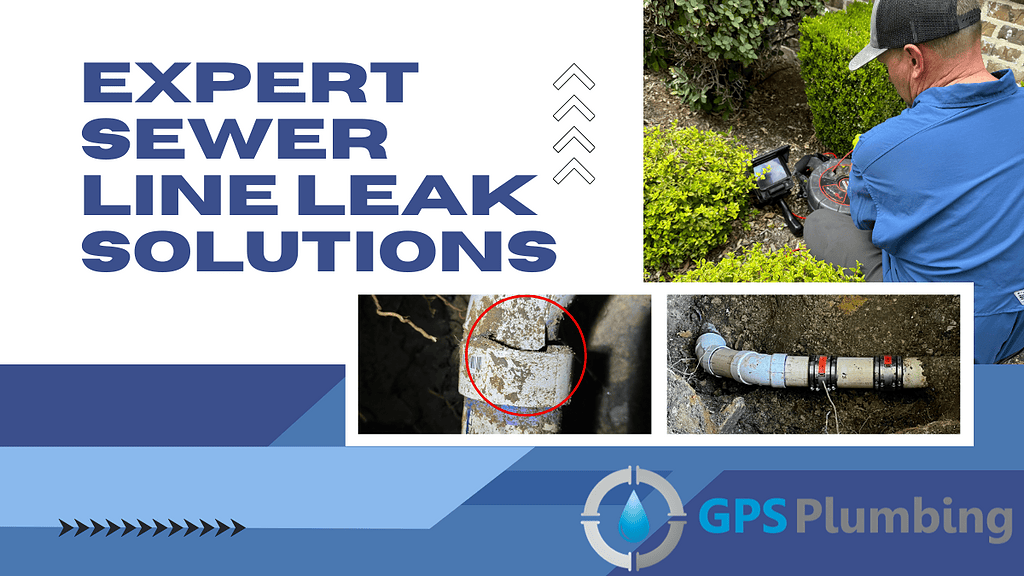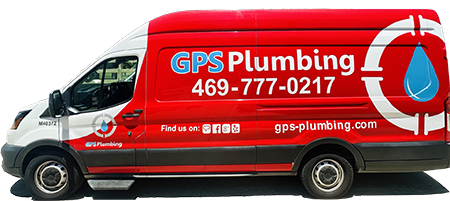
Understanding Sewer Line Leaks
Sewer line leaks can cause serious damage long before you see visible signs. Hidden underground, these leaks can impact your home’s foundation, cause unpleasant odors, and create costly repairs if not addressed promptly. At GPS Plumbing, we help North Texas homeowners identify, diagnose, and repair sewer line issues quickly and professionally.
Signs You May Have a Sewer Line Leak
- Wet spots or puddles in your yard
- Soggy or overly lush patches of grass
- Foul sewer odors inside or outside your home
- Slow-draining sinks, tubs, or showers
- Gurgling sounds coming from drains
- Foundation cracks or shifting soil
- Backed-up toilets or multiple drain clogs at once
If you notice any of these warning signs, it’s important to act quickly to minimize damage.
How We Diagnose Sewer Line Problems
At GPS Plumbing, we use advanced technology to accurately diagnose sewer line issues:
- Sewer Camera Inspections: We insert a specialized camera into your sewer line to get a clear view of the inside. This allows us to pinpoint the exact location of leaks, cracks, or blockages without unnecessary digging.
- Electronic Line Locators: After locating the problem internally, we use electronic locators to find the exact spot underground. This minimizes disruption to your yard or foundation.
- Isolation Testing: When needed, we block off different sections of your sewer system to isolate leaks. This method helps determine which areas are compromised and prevents unnecessary excavation.
Early diagnosis saves time, money, and prevents larger plumbing emergencies from developing.
Common Causes of Sewer Line Leaks
Understanding what can cause a sewer line to leak helps in prevention and timely repairs:
- Root Intrusion: Tree roots are one of the most common causes of sewer line leaks. Roots seek out moisture and can infiltrate small cracks in the pipes, eventually causing significant damage.
- Corrosion and Deterioration: Over time, older pipes, especially cast iron ones, can corrode, leading to leaks. Homes built before the 1980s often have these older pipes, which are prone to deterioration.
- Ground Shifts: Natural ground movement, whether from earthquakes, construction, or natural settling, can crack or misalign sewer pipes, leading to leaks.
Sewer Line Repair Options
Our approach to repairing a leaking sewer line depends on the severity of the damage:
- Spot Repairs: For minor leaks or localized damage, we can perform spot repairs by
accessing and fixing the affected section of the sewer line. This option is less invasive
and can be completed relatively quickly. - Full Sewer Line Replacement: For more extensive damage, especially in older homes
with deteriorating cast iron pipes, replacing the entire sewer line or significant portions
of it with durable PVC pipes may be necessary. This approach ensures long-term
reliability and minimizes the likelihood of future leaks.
Detailed Timeline for Sewer Line Replacement
A comprehensive sewer line replacement is a multi-step process, each phase carefully planned
and executed:
- Diagnosis & Testing: We begin with a thorough assessment, including camera
inspections and isolation testing, which typically takes a few hours. - Excavation: Once the problem is identified and a repair plan is agreed upon, excavation
begins. Depending on the extent of the damage, this can take up to three days. Our
skilled excavation team carefully digs access tunnels to minimize disruption to your
property. - Pipe Replacement: After excavation, we replace the damaged pipes with new PVC
pipes. This phase typically takes about six days, ensuring all new fittings are properly
installed and the system is anchored to prevent future movement. - Backfilling & Final Inspection: The final step involves backfilling the tunnels, compacting
the soil, and performing a thorough inspection to ensure the repairs meet all safety and
quality standards. This process usually takes one day.
Preventing Future Sewer Line Leaks
Preventative measures can help extend the life of your sewer system and avoid costly repairs:
- Regular Inspections: Schedule regular inspections to catch potential issues before they become major problems. This proactive approach can save you money in the long run and keep your plumbing system functioning efficiently.
- Tree Root Management: Regularly managing tree roots near your sewer lines can prevent root intrusion, one of the leading causes of sewer line leaks. Consider root barriers or other preventative measures if trees are close to your sewer line.
- High-Quality Repairs and Materials: Always use high-quality materials for any repairs or replacements. At GPS Plumbing, we only use the best materials to ensure long-lasting durability.
Why Choose GPS Plumbing?
When it comes to sewer line repairs, GPS Plumbing offers unmatched expertise, reliability, and customer service:
- Expertise in Under-Slab and Sewer Line Repairs:
We specialize in diagnosing and repairing complex sewer line leaks, including under slab foundations and homes with aging cast iron pipes. - Advanced Diagnostic Tools:
We use sewer cameras, electronic line locators, and isolation testing to precisely locate problems and recommend the best solutions with minimal disruption. - High-Quality Workmanship:
Every repair or replacement is completed with top-grade materials and professional craftsmanship to ensure long-lasting results. - Honest, Straightforward Pricing:
No hidden fees, no confusing fine print — just clear estimates and trusted advice from a family-owned company you can rely on. - 2-Year Warranty on Sewer Line Replacements:
We stand behind our work with a two-year warranty on under-slab sewer line replacements, giving you peace of mind that your plumbing system is built to last. - Proudly Serving North Texas:
As a family-owned business based in Frisco, we proudly serve homeowners in Frisco, Plano, McKinney, Prosper, Celina, Little Elm, Hackberry, Allen, and The Colony.
For the latest standards and technologies in maintaining and repairing sewer systems, you can explore resources from the National Association of Sewer Service Companies (NASSCO), which provides professional insights to help keep your sewer lines in top condition.
FAQs About Sewer Line Leaks
How do I know if my sewer line is leaking?
Common signs include soggy patches in the yard, foul odors inside or outside your home, gurgling drains, slow drainage, or multiple clogged fixtures at once.
How long does sewer line replacement usually take?
Most full sewer line replacements take about 1-5 days, depending on the severity of the damage and the amount of excavation needed.
Can tree roots really cause sewer line damage?
Yes. Tree roots are a leading cause of sewer leaks, as they naturally seek out moisture and can grow into tiny cracks in older pipes.
Will my entire yard be dug up to fix a sewer leak?
Not always. At GPS Plumbing, we use sewer cameras and locators to precisely identify the problem and minimize digging whenever possible.
Is sewer line repair typically covered by homeowners insurance?
Sometimes. Sudden and accidental damage may be covered, but regular wear and tear usually isn’t. It’s best to review your policy or speak with your insurance provider.
Contact GPS Plumbing at 469-777-0217 for professional, reliable sewer line repair and replacement services.
✨ Updated for 2025 to help North Texas homeowners recognize, diagnose, and repair sewer line leaks with GPS Plumbing. ✨
Suggested Reading:

